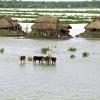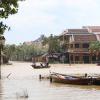
Systemic Risk and Resilience (SYRR) aims to assess and support the management of systemic anthropogenic and environmental risks.
The SYRR research group analyses the increasingly systemic socio-ecological risks associated with global and local change, and with policy, practice and civil society co-generates options for building resilience.
Global change through rising physical and social interdependencies is leading to increasingly systemic and existential risks that lead to cascading impacts and potentially intolerable burdens on communities and societies across the world.
SYRR develops and applies agile systems science to address social-ecological risks that are embedded in complex systems and characterised by potentially cascading, irreversible and existential consequences. We identify risk drivers, model network interactions, assess probabilistic outcomes and co-develop stakeholder-driven options with policy, practice and civil society that are applicable across scales.
Our approach for addressing existential and systemic risk combines advanced quantitative modeling and qualitative research with empirical assessment and soft systems analysis.
SYRR research is conducted along the following thematic research lines:
1. Systemic Risk Assessment and Management
Advance and apply quantitative estimation methods to assess emerging systemic risks and disaster resilience.
2. Socio-Ecological Resilience
Develop and apply ecological network principles to the resilience in socio-ecological systems.
3. Co-production, Engagement and Experiential learning
Effectively apply and develop participatory methods with policy and practice to create impact.
4. Risk and Resilience Policy and Practice
Further develop and apply methods to inform risk management and climate adaptation decision-making in planning, coordination, and policy formation, with attention to complex multi-stakeholder and multi-criteria contexts.
We focus, inter alia, on risk and resilience associated with climate change, disasters, food webs, finance and pandemics. SYRR work builds on activities and experience gained from the previous IIASA programs on Risk and Resilience (RISK) as well as Advanced Systems Analysis (ASA) and Evolution and Ecology (EEP).
Resilience labs
In order to address complex resilience problems, SYRR implements Resilience Labs. These labs bring together research, policy and practice in transdisciplinary co-generative exercises using quantitative and qualitative research methods for creating enhanced insight and impact.
Resilience labs held and planned:
- Limits to adaptation workshop held (see paper).
- Resilience in the Loss&Damage space: Expert-elicitation workshop in December 2024 (see project site).
- Polycrisis and systemic risk (planned for 2025).
- Multi-hazard and complex risk (planned for 2025).
- Resilience in economic and financial systems (online series in planning).
Projects
Staff
News

20 January 2025
SPARCCLE Workshop Gathers EU Policymakers for Policy Feedback and Insights
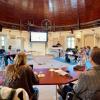
05 November 2024
SPARCCLE Consortium Marks One-Year Milestone with In-Person Meeting and Workshops
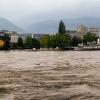
04 October 2024
Countries under fiscal pressure from recent disaster events
Events
Focus

13 November 2024
COP29: Loss and Damage funding has to be at core of new climate finance regime
The focus of the ongoing COP is to decide on a new finance regime. Major polluters will be asked to massively increase their financial contributions to developing nations. Researchers from IIASA and CMCC show that Loss and Damage needs of vulnerable countries range between roughly 130 and 940 billion Dollars in 2025 alone. On top of money for mitigation and adaptation.
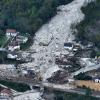
17 October 2024
Navigating multi-hazard risks: building resilience in a systemic risk landscape
IIASA researchers Robert Sakic Trogrlic and Stefan Hochrainer-Stigler explore the growing complexity of natural hazards and their interconnected impacts on communities. Their research offers insights into the challenges faced by communities worldwide and underscores the importance of building more resilient systems in an interconnected, increasingly hazard-prone world.
Publications
Zisopoulos, F.K., Fath, B. , Meirelles De Oliveira, B., Toboso-Chavero, S., D'Assenza-David, H., de Souza, V.M., Huang, H., Scrieciu, Ş., Clark, O.G., Noll, D., Singh, S., Stefanakis, A., Boyd, G., Schraven, D., & de Jong, M. (2025). Towards an ecological metaphor for regenerative circular economies. Ecological Economics 231 e108545. 10.1016/j.ecolecon.2025.108545. Jóhannsdóttir, L., Sigurjonsson, T.O., Wendt, S., Latapí, M., & Kharrazi, A. (2025). Current and future research in environmental sustainability: Synthesise of the role, responsibilities, and opportunities for the business sector. Current Research in Environmental Sustainability e100282. 10.1016/j.crsust.2025.100282. (In Press) Zisopoulos, F.K., Fath, B. , Tong, X., & de Jong, M. (2025). Network properties of the global waste trade. Environmental and Sustainability Indicators 25 e100550. 10.1016/j.indic.2024.100550. Bera, B.K., Tzuk, O., Bennett, J.J.R., Dieckmann, U. , & Meron, E. (2025). Can spatial self-organization inhibit evolutionary adaptation? Journal of The Royal Society Interface 22 (222) e20240454. 10.1098/rsif.2024.0454. Thompson, H.E., Gill, J.C., Sakic Trogrlic, R., Taylor, F.E., & Malamud, B.D. (2025). A methodology to compile multi-hazard interrelationships in a data-scarce setting: an application to Kathmandu Valley, Nepal. Natural Hazards and Earth System Sciences Discussions 25 353-381. 10.5194/nhess-2024-101.

